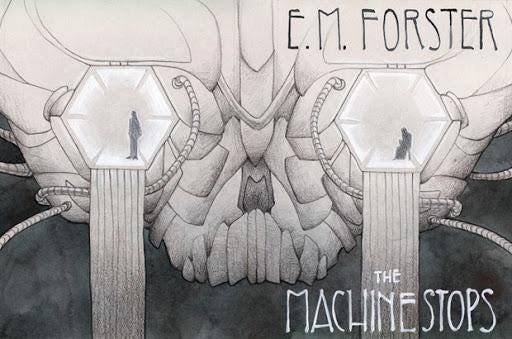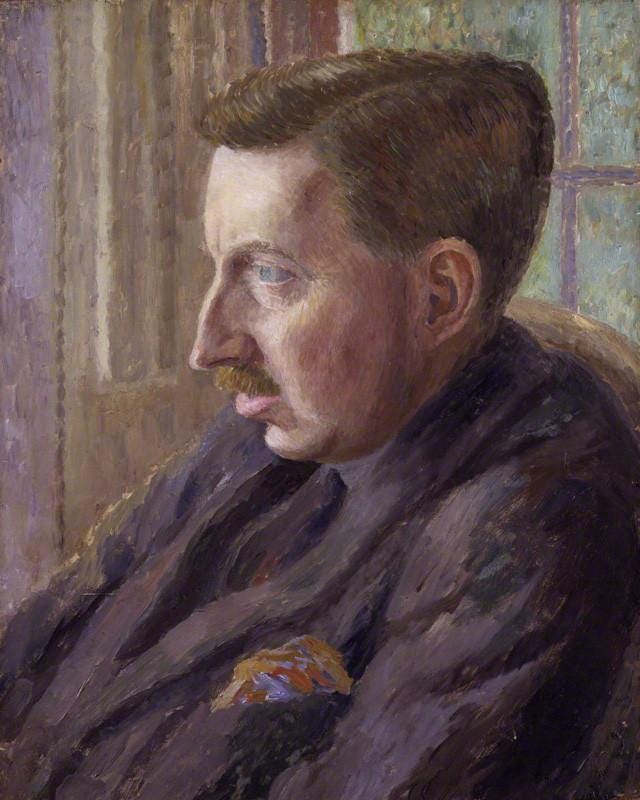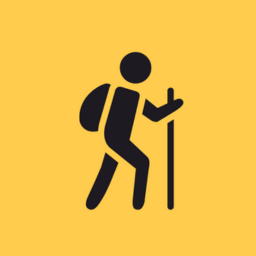[From the Archives] The Future in the Present
How Science Fiction Informs Our Sense of Adventure...or Lack Thereof

Greetings fellow wanderers,
Today I am republishing another post from the archives. As Those Who Wander is quickly approaching 500 subscribers and gaining momentum, I realize the bulk of new subscribers may not have access to some of my initial writings. With 82 posts in the archive now, I want to give some exposure to these paywalled posts.
That said, if you are enjoying these ramblings on travel, adventure, and anthropology, please consider supporting my writing which grants you full access to everything I’ve written on Substack. In addition, the proceeds will go toward publishing and promoting my forthcoming book ‘An Anthropology of Wandering: How Adventure Can Alleviate a Fearful Culture’. The book is a first-person account of backpacking the Appalachian Trail that dives into anthropology, travel, fear, and the meaning of adventure in culture and society.
Looking for a gift idea for the holidays? Consider a gift subscription to Those Who Wander.
Lastly, Substack recently enabled an exciting new feature on their app—text-to-speech for all your favorite posts! You can now listen to anything published at Those Who Wander just like a podcast. And it’s incredibly simple:
Navigate to the post you want to listen to.
Click the play button in the upper right-hand corner of the screen.
Voilà!
Thank you to everyone who has subscribed and supported my work thus far. Cheers! -JSB
“Either life entails courage, or it ceases to be life.”
-E. M. Forster
I’ve recently come to love science fiction because it allows us to think deeply about the future we’re creating in the present. English author E.M. Forster is perhaps most famous for writing A Passage to India. Few are aware he wrote a powerful prediction of our present moment in the form of a startling dystopia. In 1909, his science fiction short story The Machine Stops was published.
Forester’s imagined world depicts an ominous scene of a planet raked clean of its resources, where some ambiguous, yet suspected man-made, catastrophe has coerced humans to live below the earth’s surface, isolated and confined to tiny self-contained rooms within an enormous subterranean machine. They communicate with others only via the machine through instant messaging, email, and something akin to today’s Zoom, yet it suspiciously “does not transmit nuances of expression.”
The passengers’ minds and bodies have nearly atrophied, their figures becoming a “swaddled lump of flesh…with a face as white as a fungus” and “without teeth or hair.” The machine even has the power to make crucial decisions on human life, like carrying out infanticide of those “who promised undue strength” since it was a “demerit to be muscular.” The machine provides all they could ever want or need at the touch of a button and no longer requires people to interact face-to-face, despite the ironic fact that “human intercourse had advanced enormously” through telecommunication.
Over time, it becomes common knowledge that the surface of the earth remains uninhabitable, merely “dust and mud,” and people are encouraged to fear traveling to the surface and to fear anyone who wishes to do so. It becomes illegal to travel to the surface and punishable by “homelessness,” a euphemism translating to death, as mandated by the machine. The protagonist is Kuno, a young man, rebellious, precocious, and eager to venture to the surface. He attempts to encourage his mother Vashti to travel to the surface with him, but she replies that she has no time or interest in such an unnecessary and silly thing.
Kuno’s mother lives contentedly in her room on the other side of the planet with no ambition other than participating in her “lectures”, essentially gossip on widely unrelated and unoriginal topics. She remains apathetic and reluctant to visit her son and perceives going to the surface as foolish and dangerous. When she first attempts to make the journey to see her son, all of which is completely automated by the machine with little to no physical exertion required, she becomes “seized with the terrors of direct experience.” The only means of travel is through the machine on its airships. As passengers on the airships speed high above the seemingly desolate and appalling earth, they are unnerved and deeply distressed by the direct sensations of natural phenomena. Seeing such things as the stars, sun, islands, and mountains “give me no ideas,” Vashti complains when viewing the Greek islands and Himalayan and Caucasus Mountains aboard an airship, finally en route to see her son.
Aside from making the rather extraordinary anticipations of the internet, instant messaging, visual communication, and artificial intelligence, Forster’s dystopia reveals other striking and rather uncanny parallels with our contemporary world and the potential consequences of technological overdependence. Despite being virtually liberated from physical work or demanding schedules, people still feel as though they have no time and certainly no time to waste on traveling and adventure. In their online communication networks, it is far more popular to discuss second-hand ideas rather than the original content. People no longer value the source of their ideas, but rather the opinions of those original ideas. They feel completely comfortable and confident interacting and sharing ideas via the machine, yet feel utterly alienated, uncomfortable, and repulsed by face-to-face interactions. Indeed, it has become a high-brow culture and a sign of being an “advanced thinker” not to engage firsthand with a person or any other direct experiences. Sounding familiar?
Over time, the knowledge and ideas they possess become so far removed and diluted from the truth that understanding devolves into disjointed hearsay; some may deem it “fake news.” When they need a word to express themselves, they summon the machine to do it for them. Indeed, the machine, Kuno suspects, “penetrates our blood and may even guide our thoughts.” The substance of their “lectures” is about places on the earth and the history of those places, but none of the passengers have been inclined to physically visit the sites, for fear of venturing to the supposed barren surface of the earth. What’s more, they feel sufficiently informed by other people’s opinions of the sites and arrogantly talk about them as though they have been there and know all about them.
Discontented and curious, Kuno journeys to the surface and discovers the earth to be green with life in recovery and finds a few other rebellious people who have managed to forge a life free of the machine. He uses some information he received in a lecture to pinpoint his location based on the stars, but then has the epiphany that “this is the first bit of useful information I have ever got from a lecture, and I expect it will be the last.” This is shocking proof to him of how far true knowledge has disintegrated over time and how grand are the illusions that so many possess. Kuno now feels emboldened by these revelations and becomes enlightened about how absurd life has become. He comes to pity everyone who is living according to the misplaced fears and ignorant opinions of others.
The climax of this tragic world unfolds when the machine begins to break down. Everyone is in denial as they try to convince themselves that the malfunctions are merely the “whim” of the machine, which by now has been mystically interpreted as a god and they have forgotten it was once built by humans. As the complaints and panic grow and their conditions worsen, they are left idle without the skills, knowledge, self-reliance, or will to repair the machine and save themselves. This horror show is the extreme end of a world devoid of human trust, responsibility, and agency. A world without a sense of adventure, wonderment, or courage.

Stories like this provide a lot of food for thought. Though the predictions of future gadgets by science fiction authors are fun and surprising, the impacts on society and culture as a result of technology are far more interesting and relevant for us to consider. We might reflect on the role technology plays in our sense of adventure. How much is our technology restricting us as well as liberating us? How close are we to enabling technology to override our sense of exploration and mold our experiences for us? Is this something we want, living out our experiences through machines? Is this just inevitable? Do we have any agency left in the matter? What impact is this having on our relationships with one another? Are we truly connected like never before or are more of us becoming isolated beings confined to lonely cells? Are we as comfortable with ourselves and others in real life as we appear to be on comment threads? What future are we creating right now?
Though dystopias naturally dramatize the extremes, are we so confident that in a hundred years we won’t be as distant from nature and the lives of others as Forster detailed? Technology can be wonderful, but it should only supplement or enrich our lives and never be a surrogate for our experiences.
Whatever the technology of the future brings, Kuno’s spirit is what most resonates with me. Defying conventional wisdom is not always easy and rewarding. Nor is it necessarily wise. It leads to a lot of self-doubt, anxiety, and dead ends. In my own life, I’ve seen the value of not always going along with the crowd and learning how to chart my own heterodox path which can be gratifying. But it does come with costs. Doing uncommon things like pursuing an archaeological career or backpacking the Appalachian Trail sounds adventurous on the surface and it can be. However, they are also fraught with insecurities and you’re always wondering if you’ve made the right decision. At the end of the day, I do think it is worth it to challenge our conventional wisdom and defy what others say is impossible or unwise which is the essence of being adventurous.
Thanks for being a fellow traveler with me through this read. Much more to follow.
Cheers!
-JSB






Really enjoyed listening to this with the new text-to-speech feature
There’s always a cost, right? I remember reading somewhere that Happiness doesn’t come from the absence of problems, so much as from the opportunity to choose the sort of problems you want to solve for in your life.